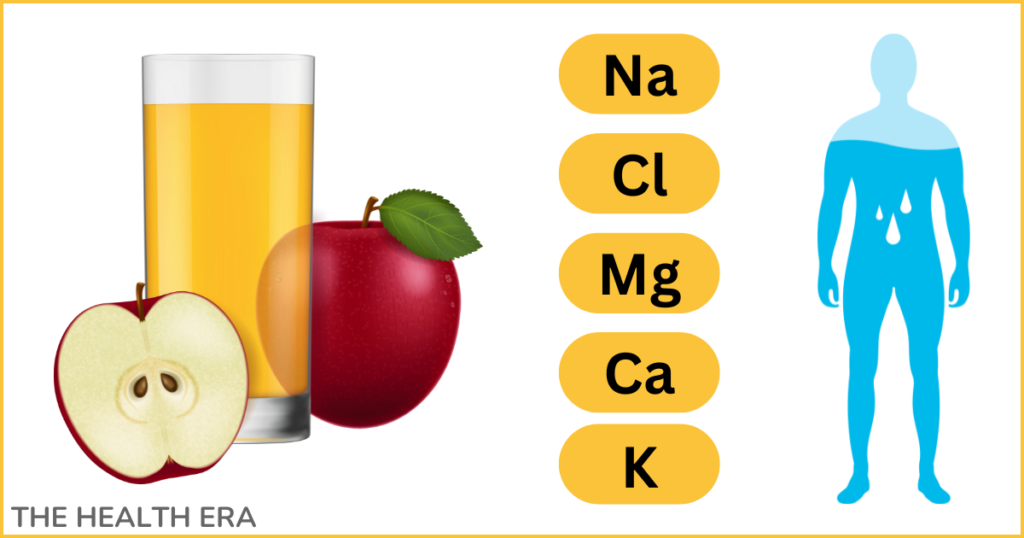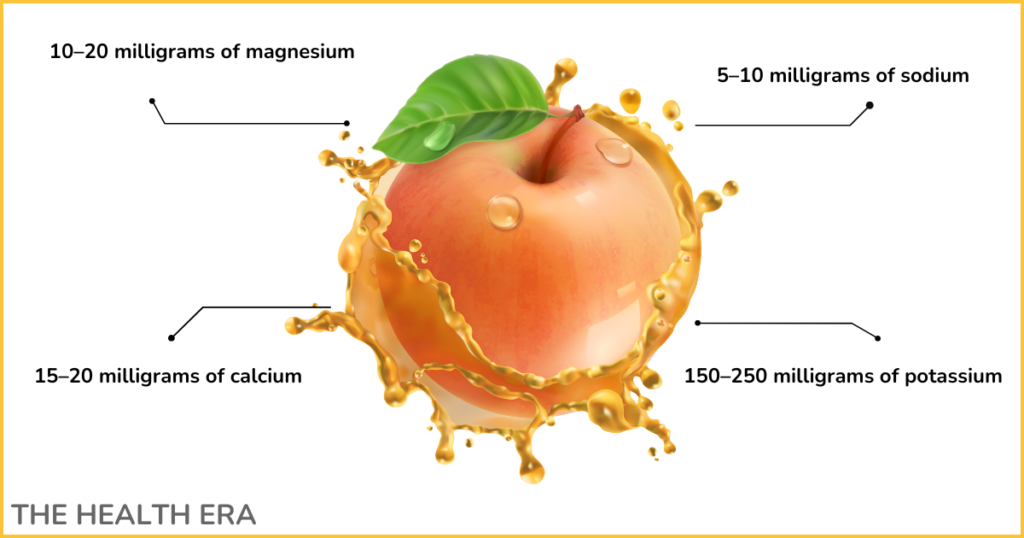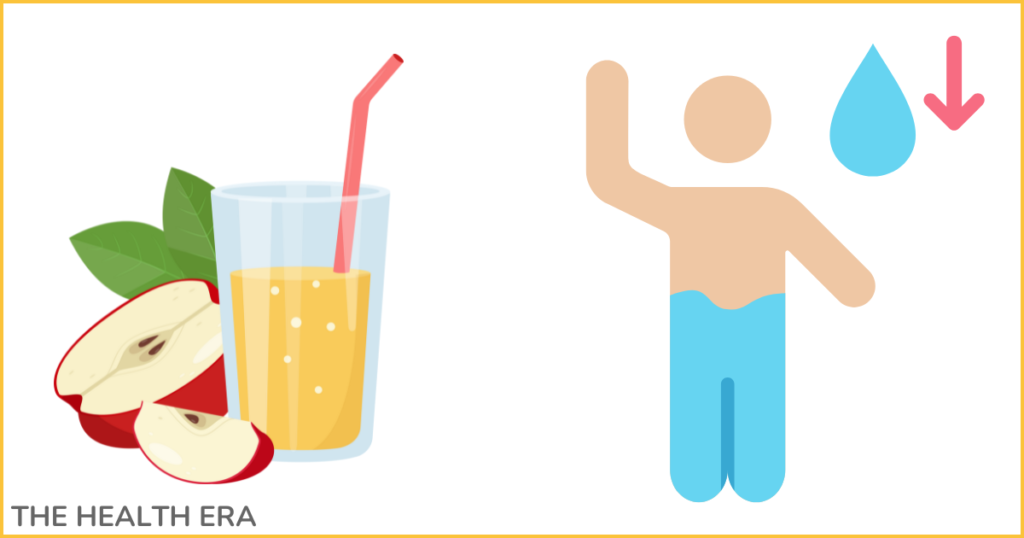We all know how important it is to stay hydrated, right? It’s one of the most important things you can do for your body. Water is essential for our daily life, but sometimes you need more than just water to replenish what your body loses.
This is where electrolytes come in. Electrolytes are minerals like potassium, sodium, magnesium, and calcium that help your body function properly. They keep your muscles, nerves, and heart working as they should. But does apple juice have electrolytes? Let’s discover the science and find out how to stay hydrated by using apple juice.
What Are Electrolytes and Why Do You Need Them?
Electrolytes are tiny charged particles that help your body maintain balance. They play a key role in hydration, muscle function, and nerve signaling. When you sweat, exercise, or lose fluids due to illness, vomiting, or diarrhea, your body loses electrolytes. Replenishing them is essential to avoid dehydration and keep your body running smoothly.
Common electrolytes include potassium, sodium, chloride, magnesium, and calcium. These minerals help regulate fluids in your body through a process called osmosis. They also help your muscles contract, your nerves send signals, and your heart beat steadily. Without enough electrolytes, you might feel tired, crampy, or even dizzy.

Does Apple Juice Have Electrolytes?
Yes, apple juice contains a mix of essential electrolytes. While it’s not as concentrated as sports drinks, apple juice is a natural source of potassium, sodium, magnesium, and calcium. These electrolytes are necessary for maintaining hydration and supporting your body’s functions. Apple juice also contains natural sugars, vitamins, and antioxidants, making it a refreshing and nutritious option.
For example, potassium is one of the key electrolytes found in apple juice. It helps regulate fluid balance, muscle contractions, and nerve signals. Sodium, another important electrolyte, works with potassium to maintain proper hydration levels. Magnesium and calcium, though present in smaller amounts, also contribute to muscle and nerve function.
A standard serving of apple juice (around 8 ounces or 240 milliliters) typically contains approximately:
- 150–250 milligrams of potassium, a crucial electrolyte for muscle function and nerve signaling, supporting cellular fluid balance and overall heart health.
- 5–10 milligrams of sodium, essential for maintaining blood volume and pressure, aiding in nerve impulse transmission, and facilitating muscle contractions.
- 10–20 milligrams of magnesium, vital for enzyme reactions, protein synthesis, and muscle and nerve function, also contributing to blood sugar control and blood pressure regulation.
- 15–20 milligrams of calcium, necessary for strong bones and teeth, muscle contraction, nerve signaling, and blood clotting, play a significant role in various physiological processes.
These values are estimates and may vary depending on the product.

Is Apple Juice Good for Dehydration?
Apple juice, like most fruit juices, is one of the most hydrating drinks you can have easily. It is composed of 88% water and packed with various vitamins and minerals. Apple juice can be a good option for mild dehydration. When you’re dehydrated, your body loses both water and electrolytes. Drinking apple juice helps refill these lost fluids and minerals. In fact, diluted apple juice has proven to be more successful in treating mild dehydration in children than some electrolyte drinks. Mixing apple juice with water can make it easier for your body to absorb the fluids and nutrients.
However, apple juice is not a replacement for water or specialized electrolyte drinks in cases of severe dehydration. For everyday hydration, though, it’s a tasty and effective choice. Plus, the natural sugars in apple juice provide a quick energy boost, which can be helpful after exercise or during recovery from illness.
1. Hydration Benefits 💧
- Apple juice is approximately 88% water, making it a hydrating beverage that can help replenish lost fluids.
- When diluted, it becomes even more effective in restoring hydration without overwhelming the body with sugars.
2. Easy to Drink (Palatability) 🍏
- Many children (and adults) prefer the sweet, mild taste of apple juice over electrolyte solutions, which often have a salty or artificial flavor.
- Because of its pleasant taste, children are more likely to drink it voluntarily, aiding in rehydration.
3. Scientific Evidence & Study Support 📚
- A study published in the Journal of the American Medical Association (JAMA) found that diluted apple juice was just as effective as electrolyte solutions in treating mild dehydration in children with gastroenteritis (stomach flu).
- The study concluded that children who drank diluted apple juice were less likely to require IV fluids compared to those given traditional electrolyte solutions.
4. Pediatrician Recommendations 👶
- Some pediatricians recommend half-strength apple juice (mixed equally with water) as a first-line option for mild dehydration in children.
- It provides a gentler and more palatable alternative before resorting to electrolyte replacement drinks.
5. Not a Substitute for Electrolyte Solutions in Severe Cases ⚠️
- Lacks Key Electrolytes: While apple juice contains potassium and small amounts of magnesium, it lacks sodium, which is crucial for treating moderate to severe dehydration.
- Severe dehydration requires medical intervention, including oral rehydration solutions (ORS) or IV fluids, depending on the severity.
6. Important Precautions 🚼
- Not for Infants Under 6 Months:
- Infants younger than 6 months should not be given apple juice for dehydration, as it can lead to water intoxication (hyponatremia)—a dangerous drop in sodium levels.
- Exclusions in Research:
- The Canadian study that tested apple juice’s effectiveness excluded children with moderate or severe dehydration, meaning its benefits apply only to mild cases.

Apple Juice vs. Sports Drinks: Which Is Better for Hydration?
Sports drinks are specifically designed to replace electrolytes lost during intense exercise. They often contain higher levels of sodium and potassium, along with added sugars for energy. While they’re effective for athletes or those engaging in prolonged physical activity, they’re not always necessary for everyday hydration.
Apple juice, on the other hand, is a natural alternative. It contains some electrolytes, along with vitamins and antioxidants that sports drinks lack. For light to moderate activity, apple juice can be a good option for replacing lost electrolytes. Plus, it’s free from artificial colors and flavors, making it a healthier choice for many people.
Here’s a deeper look at how they compare:
1. Sports Drinks: Best for Intense and Prolonged Activities 🏃♂️🏋️♀️
✅ Pros:
✔ Electrolyte Replenishment: Sports drinks contain sodium, potassium, and chloride, which help restore electrolytes lost through sweat, preventing dehydration and muscle cramps.
✔ Energy Boost: They provide carbohydrates (usually from sugar) that fuel muscles during long-duration or high-intensity exercise.
✔ Improved Fluid Retention: Some formulas help the body absorb and retain fluids more efficiently than plain water.
❌ Cons:
✘ High Sugar Content: Many sports drinks contain excess sugar, which can contribute to weight gain and dental issues when consumed regularly.
✘ Not Necessary for Low-Intensity Exercise: For short workouts (under an hour) or light activities, plain water is usually enough.
✘ Not Recommended for Children: The American Academy of Pediatrics states that children usually don’t need sports drinks, as they can lead to excessive sugar intake and unnecessary calorie consumption.
✅ Best for:
- Long-distance running, cycling, or endurance training.
- High-intensity workouts lasting over an hour.
- Athletes who sweat excessively and need electrolyte replenishment.
2. Apple Juice: A Natural Hydration Option 🍏💧
✅ Pros:
✔ Hydrating: With 88% water content, apple juice provides hydration while also being a more palatable alternative to plain water.
✔ Natural Sugars for Energy: Contains fructose and glucose, which provide a quick energy boost.
✔ Vitamins & Minerals: Apple juice contains potassium, vitamin C, and small amounts of magnesium and iron, offering some nutritional benefits.
✔ Easier to Drink: Many people (especially children or those recovering from illness) find it more appealing than water, increasing fluid intake.
❌ Cons:
✘ High in Sugar: A standard cup of apple juice has about 24g of sugar, similar to some sports drinks, which can cause blood sugar spikes and crashes if consumed in excess.
✘ Lacks Electrolytes: Unlike sports drinks, apple juice does not contain sodium, which is essential for replenishing lost electrolytes during intense sweating.
✘ Not Ideal for Athletes: While hydrating, it lacks the optimal balance of electrolytes and carbohydrates needed for prolonged exercise performance.
✘ Better When Diluted for Children: Studies suggest that diluted apple juice (50% juice, 50% water) may work as well as oral rehydration salts for children with mild dehydration caused by stomach issues.
✅ Best for:
- Mild dehydration (especially in children).
- Short, low-intensity activities where electrolyte loss is minimal.
- Recovery from illness when eating solid food is difficult.
3. Which is Better? 🤔
| Situation | Best Choice |
|---|---|
| Basic hydration (daily needs) | Water 💧 |
| Short, low-intensity activities (e.g., walking, yoga) | Water or diluted apple juice 🍏💦 |
| Mild dehydration (children/adults) | Diluted apple juice 🍏💦 |
| Long or intense workouts (1+ hour of sweating) | Sports drinks 🏋️♂️🏃♀️ |
| For children in sports | Water first, sports drinks only if needed 🚸💧 |
| For sick individuals with mild dehydration | Diluted apple juice 🍏🤒 |
Final Thoughts
- Water is the best option for everyday hydration and low-intensity activities.
- Diluted apple juice can be helpful for mild dehydration, especially in children or those recovering from illness.
- Sports drinks are ideal for high-intensity, prolonged workouts where electrolyte loss is significant.
Apple Juice: Nutrition, Benefits, and Considerations
Apple juice is more than just a source of electrolytes. It’s a popular and refreshing beverage packed with essential vitamins, minerals, and antioxidants. While it offers several potential health benefits, it also contains a high amount of natural sugars that should be consumed in moderation:
Nutritional Information
A one-cup (8-ounce) serving of 100% apple juice contains various essential nutrients that contribute to overall health:
- Vitamins:
- Vitamin C: Supports immune function, helps with wound healing, and promotes collagen production.
- B Vitamins: Includes B1 (thiamine), B2 (riboflavin), and B6, which help convert food into energy and support brain health.
- Minerals:
- Copper: Helps in red blood cell formation and supports the immune system.
- Magnesium: Plays a role in muscle function and nerve signaling.
- Iron: Important for oxygen transport in the blood.
- Manganese: Contributes to bone health and metabolism.
- Potassium: Helps regulate blood pressure and fluid balance in the body.
- Antioxidants:
- Polyphenols: These plant compounds help protect cells from oxidative stress and reduce inflammation.
- Caloric Content:
- 119 calories per cup: Most of the calories in apple juice come from natural sugars.
- Carbohydrates & Sugar:
- 28 grams of carbohydrates per cup: Provides a quick source of energy.
- 24 grams of sugar per cup: While natural, excessive consumption may contribute to weight gain and blood sugar spikes.
Potential Health Benefits
Regular consumption of apple juice may contribute to several health benefits:
- Boosts Immunity
- The high vitamin C content helps strengthen the immune system, making it easier to fight infections.
- Aids Digestion
- While whole apples are higher in fiber, apple juice still contains trace amounts that support gut health and may prevent constipation.
- Supports Heart Health
- Antioxidants in apple juice, particularly polyphenols, help reduce oxidative stress and may lower the risk of heart disease.
- May Improve Brain Function
- Some studies suggest that apple juice may protect brain cells from oxidative damage and help reduce the risk of neurodegenerative conditions like Alzheimer’s.
- Helps with Hydration
- With its high water content, apple juice can help keep you hydrated, especially in warm weather or after exercise.
- May Aid in Weight Management
- While apple juice is not as filling as whole apples, it may still contribute to satiety, reducing overall calorie intake when consumed in moderation.
- May Help Lower Cholesterol
- Some research indicates that polyphenols in apple juice may contribute to reducing bad cholesterol (LDL) levels.
- Good for Eye Health
- Apples contain vitamin A, which supports vision and may help prevent age-related eye disorders.
Things to Consider
- High in Sugar: Even though it’s natural sugar, excessive consumption can lead to weight gain and increased blood sugar levels.
- Lacks Fiber: Whole apples provide much more fiber, which aids digestion and helps regulate blood sugar.
- Moderation is Key: Drinking apple juice in small amounts as part of a balanced diet is best to maximize benefits without drawbacks.
Is Apple Juice Good for You?
Yes, apple juice can be good for you when consumed in moderation. It’s hydrating, nutritious, and offers several health benefits. However, it’s important to choose 100% pure apple juice without added sugars or preservatives. Too much apple juice can lead to excessive calorie intake and potential side effects like stomach discomfort or blood sugar spikes.
Apple juice is particularly beneficial for:
1. Hydration 💧
- Replenishes Fluids: Apple juice is composed mostly of water, making it an excellent source of hydration, especially for those who struggle to drink plain water.
- Contains Natural Electrolytes: While not as electrolyte-rich as sports drinks, apple juice does contain small amounts of potassium and magnesium, which help maintain fluid balance in the body.
- Ideal for Recovery: It can be particularly beneficial after illness, exercise, or dehydration caused by excessive heat.
2. Supports Digestion 🍏
- Natural Sugars Aid Digestion: The simple carbohydrates in apple juice provide quick energy and can be gentle on the stomach, making it a good option for individuals recovering from digestive discomfort.
- Contains Pectin:
- Pectin is a type of soluble fiber naturally found in apples. While the juicing process removes most of the fiber, some pectin remains, which can help with mild digestive issues.
- It acts as a natural prebiotic, promoting gut health by feeding beneficial bacteria.
- Soothes the Stomach: Apple juice is often recommended for mild digestive issues such as indigestion or nausea. Its mild acidity can stimulate the production of digestive enzymes.
3. Promotes Skin Health ✨
- Rich in Antioxidants: Apple juice contains powerful antioxidants such as polyphenols, flavonoids, and vitamin C, which help fight oxidative stress and reduce skin damage caused by pollution and UV rays.
- May Help Reduce Signs of Aging:
- Vitamin C supports collagen production, keeping skin firm and reducing the appearance of wrinkles.
- Hydration from apple juice helps maintain skin elasticity and a natural glow.
- Potential for Reducing Acne & Blemishes: The presence of phytonutrients may help control oil production and reduce inflammation, leading to clearer skin over time.
4. Supports Liver Function 🏥
- Helps Reduce Oxidative Stress: The antioxidants in apple juice help neutralize harmful free radicals that can damage liver cells. This is particularly beneficial for individuals exposed to toxins, processed foods, or alcohol.
- Aids Detoxification: Some studies suggest that apple juice may help stimulate the liver’s natural detoxification process by promoting bile production, which assists in breaking down fats and flushing out waste.
- May Protect Against Fatty Liver Disease: Polyphenols in apple juice could help reduce liver inflammation and lower the risk of non-alcoholic fatty liver disease (NAFLD) when consumed in moderation.
How to Use Apple Juice for Hydration
If you’re looking to use apple juice for hydration, here are some tips:
1. Dilute It for Better Absorption 💧
- Why? Apple juice is high in natural sugars, which can slow down water absorption and lead to rapid blood sugar spikes.
- How? Mixing apple juice with water (a 1:1 ratio) makes it easier for the body to absorb fluids efficiently.
- Who Benefits?
- Ideal for children, the elderly, and those with sensitive stomachs.
- Helps prevent excessive sugar intake while still offering hydration.
2. Choose 100% Pure Apple Juice 🍏
- Why? Many commercial apple juices contain added sugars, artificial flavors, and preservatives, which can counteract hydration benefits.
- What to Look For?
- Labels that say “100% pure apple juice” with no added sugars or artificial ingredients.
- Cloudy apple juice varieties, retain more polyphenols and antioxidants.
- Homemade Alternative: If possible, fresh apple juice made at home can be a healthier option, as it contains no preservatives.
3. Drink It After Exercise 🏋️♂️
- Why? Apple juice provides natural electrolytes (potassium, magnesium, and small amounts of sodium) that help replenish minerals lost through sweat.
- Best Way to Consume:
- After moderate-intensity workouts: A glass of diluted apple juice can help restore energy.
- For intense exercise: Pair apple juice with a source of protein for muscle recovery.
- Alternative Use: Can be a natural substitute for commercial sports drinks, which often contain artificial additives.
4. Use It for Mild Dehydration 🚰
- Why? Apple juice has a high water content, making it a gentle way to rehydrate when feeling slightly dehydrated.
- Who Can Benefit?
- People recovering from illness (e.g., mild fever or stomach issues).
- Those who dislike drinking plain water.
- Individuals experiencing slight dehydration due to heat exposure.
- How to Consume: Sip small amounts of diluted apple juice rather than drinking it all at once to avoid sugar spikes.
Final Thoughts: Does Apple Juice Have Electrolytes and Is It Right for You?
So, does apple juice have electrolytes? Yes, it does! Apple juice offers a natural source of hydration and essential electrolytes, particularly potassium, making it a valuable addition to your fitness and wellness routine. It’s especially beneficial for mild dehydration, recovery from illness, and refueling after physical activity or getting fit sessions.
While it’s not a replacement for specialized sports drinks or severe dehydration treatments, apple juice provides a refreshing and nutritious alternative with added vitamins, minerals, and antioxidants. For those looking to stay fit and maintain a fit and healthy lifestyle, it can be a great natural option.
Remember, moderation is key due to its natural sugar content. Diluting apple juice with water enhances its hydrating properties and makes it suitable for children and those with sensitive stomachs. To support your health and fitness goals, choose 100% pure apple juice to avoid added sugars and preservatives.
Understanding when and how to use apple juice effectively can help you harness its benefits for active and fit living, ensuring optimal hydration and overall well-being.
If you’re looking for more hydrating juice options, check out our article on The Best Hydrating Juices. Also, if you’re wondering, Does Orange Juice Have Electrolytes?, read this article to learn more about its benefits for hydration.


